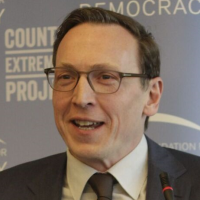
New Strategies of Transnational European-U.S. Right-Wing Extremist Combat Sports Networks
This article assesses the main strategies, networks, and threat potentials affiliated with the activities of two current key right-wing extremist (RWE)[1] leaders who first met in 2018 at a combat …
Alexander Ritzmann, DAAD/AGI Research Fellow
AGI is pleased to welcome Alexander Ritzmann as a DAAD/AGI Research Fellow from March to June 2023. He has been working on the promotion of liberal democracy and human rights …
Gibt es eine Braune-Armee-Fraktion in Deutschland?
Gibt es in Deutschland im Untergrund operierende rechtsextremistische Terrorstrukturen, gar eine „Braune-Armee-Fraktion? Seit knapp zwei Wochen ist bekannt, dass eine Gruppe Rechtsextremer über dreizehn Jahre hinweg in Deutschland gemordet und …
Is there a “Brown-Army-Faction” in Germany?
In his essay entitled Does a “Braune-Armee-Fraktion” in Germany Exist?, AICGS Non-Resident Fellow Alexander Ritzmann examines whether the “Nationalsozialistischer Untergrund,” or National Socialist Underground (NSD), can be categorized as a terrorist group. Having recently come into the public spotlight following more than a decade of under the radar murders and robberies, the German Federal government, argues Mr. Ritzmann, must be cautious in labeling this newly surfaced group.
The Benefits of Reviving Transatlantic Armaments Cooperation
Policy Report 46 During the Cold War, Germany and the U.S. fostered close arms cooperation and development. Yet, after German unification, Germany focused on developing and procuring armament systems either …




